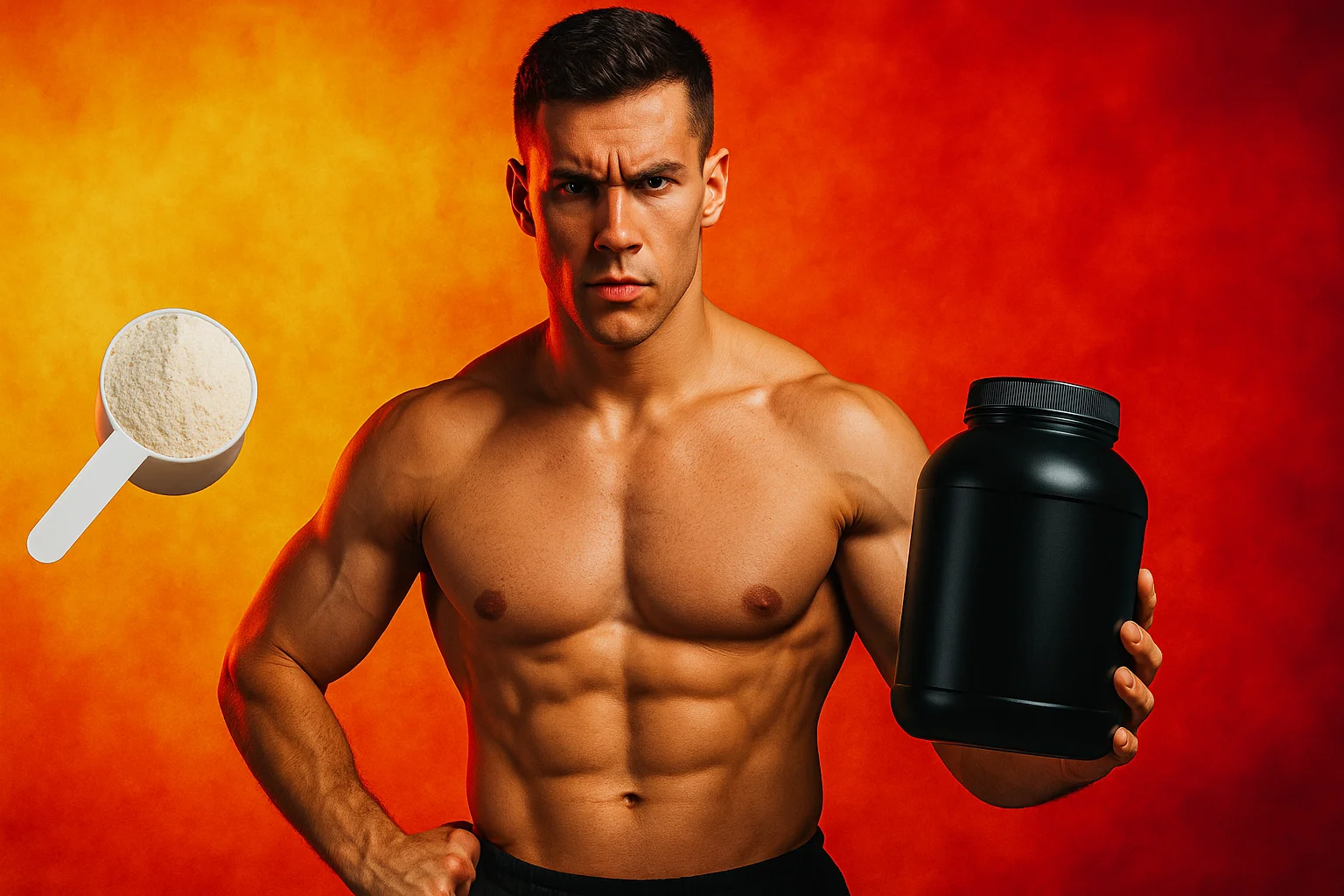In today’s fast-paced world, many men face low testosterone levels. But could cutting back on sugar be the answer? Research shows a strong link between sugar and testosterone.
Key Takeaways about Does Quitting Sugar Increase Testosterone
- Too much sugar can hurt testosterone levels and lead to weight gain and insulin resistance.
- Less sugar might help increase testosterone, improve body shape, and balance hormones.
- Slowly cutting down on added sugars and refined carbs can prevent bad side effects and help you stick with it.
- Adding healthy fats, lifting weights, and managing stress can also help with testosterone levels.
- Supplements like zinc, vitamin D, and omega-3s might naturally boost male hormones.
Introduction
Keeping testosterone levels healthy is key for men’s health. It helps with both physical and mental health. But, diets full of added sugars and refined carbs can mess with testosterone production. Knowing how sugar affects male hormones is the first step to getting back in balance and enjoying good testosterone levels.
The Impact of Sugar on Male Hormones
Studies show that eating a lot of sugar and refined carbs hurts testosterone. For instance, a study found that high-protein, low-carb diets led to a 37% drop in testosterone. Cutting down on added sugars and refined carbs could help boost testosterone in men.
The Benefits of Maintaining Healthy Testosterone Levels
Having the right amount of testosterone is vital for many health benefits in men, including:
- Supporting muscle growth and strength
- Helping with fat loss and weight control
- Boosting sexual function and desire
- Improving mood, energy, and thinking
- Keeping bones strong and heart healthy
By understanding sugar’s effect on hormones, men can take steps to keep testosterone levels healthy. This leads to many health perks.
“Cutting back on added sugars and refined carbs may help restore hormonal balance and provide various health benefits.”
The Role of Testosterone in Weight Loss
Testosterone is a key hormone for men that helps control body weight and aid in losing weight. It boosts fat burning and muscle building. This makes it vital for reaching fitness goals.
How Testosterone Affects Fat Burning and Muscle Building
Having the right amount of testosterone is key for losing fat and building muscle. It helps the body use blood sugar better with insulin, which helps with weight control. Studies link low testosterone with a higher chance of obesity and metabolic syndrome.
Testosterone also helps grow and keep lean muscle. Experts say exercising can raise testosterone levels. With more muscle, testosterone helps keep a healthy metabolism. This makes it easier to burn fat.
| Testosterone’s Impact on Body Composition | Correlation |
|---|---|
| Fat Burning | Higher testosterone levels are linked to better fat burning. |
| Muscle Building | Testosterone aids in growing and keeping lean muscle. |
| Metabolism | Healthy testosterone levels support a healthy metabolism, helping with weight control. |
Understanding testosterone’s role in losing weight and shaping the body helps people focus on improving their hormone levels. This can help them meet their fitness goals.
Foods That Lower Testosterone

A balanced diet is key for good health. But, some foods can lower testosterone levels in men. Knowing which testosterone-lowering foods to avoid is important for keeping hormones in check.
Soy Products and Testosterone
Soy products like edamame, tofu, soy milk, and miso have isoflavones that can affect androgen levels. This might lower testosterone. Studies show that soy protein isolate can decrease testosterone in men.
Other Testosterone-Killing Foods to Avoid
- Processed meats: Additives in foods like bacon, sausage, and deli meats can lower testosterone.
- Alcohol: Drinking alcohol often can reduce testosterone in men.
- High-sugar foods: Foods with lots of sugar, like baked goods and sweet drinks, can lower testosterone.
We need more research to understand how certain foods affect testosterone. But, avoiding these testosterone-lowering foods is a smart move for men wanting healthy hormone levels.
Sugar: The Hidden Testosterone Killer
Sugar is a silent enemy when it comes to keeping testosterone levels healthy. Foods high in sugar and refined carbs can greatly affect your male hormones. They cause your blood sugar and insulin to spike, which can slow down testosterone production over time.
Studies reveal that men eating soy products often see a drop in testosterone. Also, eating low-carb meals can raise the stress hormone cortisol, which hurts testosterone. Flaxseed, with its omega-3 fats, can lower healthy testosterone levels in men too.
- Licorice can cause hormone imbalances, affecting testosterone levels.
- Diet soda can cut down testosterone production because of aspartame.
- Trans fats in fast and processed foods are bad for your health and testosterone levels.
The facts are clear: sugar harms testosterone. Cutting down on sugar and choosing healthier foods can help your body make more testosterone. This leads to better male hormone levels.
“Reducing sugar intake improved health markers in obese children after just 9 days.” – Research by Lustig et al.
To eat less sugar, stay away from processed foods, cook at home, and pick veggies as snacks over sweets. The right carbs are key for making testosterone, so balance your diet for better health and energy.
Does Quitting Sugar Increase Testosterone?
Reducing sugar in your diet can help boost testosterone levels. Studies link high sugar intake to lower testosterone in men. A 2018 USA study found that high sugar intake lowers testosterone in young, healthy men. Sugary drinks like soda are a big part of this issue.
Too much sugar messes with your body’s hormonal balance. Eating lots of added sugars and refined carbs causes insulin and blood sugar spikes. This can mess up how your body makes testosterone. This imbalance can lead to weight gain and a lower sex drive.
But, cutting sugar can help bring testosterone levels back up. Research shows that one sugary drink a day can increase inflammation, insulin resistance, and bad cholesterol. By avoiding these sugars, your body can keep making testosterone well.
| Potential Benefits of Quitting Sugar | Potential Risks of Excessive Sugar Intake |
|---|---|
|
|
The impact of quitting sugar on testosterone varies by person. For some, changing their diet and lifestyle can help. But for serious cases, you might need Testosterone Replacement Therapy (TRT). Always talk to a healthcare professional to find the right plan for you.
“Consuming white bread can lead to a spike in inflammatory markers that remain elevated for at least two hours, indicating chronic low-grade inflammation.”
Strategies for Cutting Out Sugar
Reducing sugar intake is a big step towards better health. You can try different ways to cut sugar, like a slow decrease or quitting cold turkey.
Gradual Reduction vs. Cold Turkey Approach
Starting slow might work better for some, letting your taste buds adjust. It means slowly cutting down sugar in your diet. This makes it easier to switch to healthier foods. The “cold turkey” method can work fast but might be hard to keep up.
Replacing Sugary Foods with Healthier Alternatives
Choosing healthier foods is crucial when cutting out sugar. Here are some good options:
- Fresh fruits and vegetables
- Nuts and seeds
- Lean proteins
- Healthy fats like avocado, olive oil, and nuts
- Whole grains
These foods can help you feel full and give you energy. They don’t have the bad effects of too much sugar.
| Sugary Foods to Avoid | Healthier Alternatives |
|---|---|
| Soda and sweetened beverages | Water, unsweetened tea, or infused water |
| Baked goods and pastries | Whole grain breads, oatmeal, or fruit-based desserts |
| Candy and chocolate | Dark chocolate, fresh fruit, or nuts |
| Breakfast cereals | Eggs, Greek yogurt, or overnight oats |
Exercise and Testosterone
Certain exercises can boost testosterone levels. High-intensity interval training (HIIT) and strength training are great options. They help release growth hormones and build lean muscle, which is good for testosterone.
Strength training and HIIT workouts can raise testosterone levels for 15 minutes to an hour after exercise. This boost might not last long, but it’s good for testosterone health. It helps with weight management and muscle growth.
- Strength training exercises, such as weightlifting, have a positive impact on testosterone levels.
- High-intensity interval training (HIIT) workouts can also stimulate testosterone release.
- Endurance-based exercises, like prolonged cardio, may not have as significant an effect on testosterone compared to strength training.
But, too much endurance sports or eating too few calories can lower testosterone. It’s key to balance your workouts with strength training and HIIT for good hormone health.
“Strength and resistance training have been shown to increase testosterone levels over time.”
Keeping a healthy weight is also important for testosterone. Being overweight or obese can lower testosterone levels. Losing a bit of body fat can raise testosterone levels.
By choosing the right exercise and focusing on wellness, men can help their testosterone levels. This can improve their health and performance.
Stress Management for Testosterone Health
Chronic stress can really affect testosterone production. Cortisol, the body’s stress hormone, can block testosterone’s effects and upset the hormonal balance. Using stress-reduction techniques can help manage stress and support healthy testosterone levels.
The Role of Cortisol in Testosterone Regulation
When stressed, the body releases cortisol, which can mess with testosterone production. High cortisol levels can lower testosterone, leading to issues like erectile dysfunction, fatigue, less muscle mass, and more body fat.
Stress-Reduction Techniques
Adding stress-reduction activities to your daily life can lessen cortisol’s bad effects on testosterone. Here are some good ways to do it:
- Meditation: Regular meditation can lower stress and cortisol, helping to balance hormones.
- Yoga: Yoga mixes physical activity with mindfulness, making it great for managing stress.
- Deep breathing: Deep, controlled breaths can calm the nervous system, reducing stress and anxiety.
- Emotional Freedom Techniques (EFT): Also known as “tapping,” EFT is a form of acupressure that can ease emotional stress and help you relax.
By adding these stress-reduction methods to your life, you can help support your testosterone health and overall well-being.
“Effective stress management is crucial for maintaining optimal testosterone levels and overall hormonal balance.”
Supplements for Testosterone Support
Certain supplements can help boost testosterone levels, besides diet and lifestyle changes. Zinc, vitamin D, and omega-3 fatty acids support male hormone production and balance. Talking to a healthcare professional before starting these supplements can help increase natural testosterone levels.
Zinc, Vitamin D, and Omega-3 Supplements
After 40, testosterone levels drop by 1% to 2% each year. To fight this decline, supplements like zinc and vitamin D can be helpful.
- A study showed that college football players taking 30 milligrams of zinc daily raised their testosterone levels. Adult men need about 11 mg of zinc daily.
- Overweight men taking 3,332 IU of vitamin D daily for a year saw a big jump in testosterone levels. Those not taking vitamin D didn’t see this increase.
- Omega-3 fatty acids in fish oil supplements also boost testosterone production and balance hormones.
Remember, supplements should be used with care. Testosterone boosters aren’t FDA-approved as drugs. Supplements with zinc or ashwagandha might cause side effects like sleepiness, diarrhea, vomiting, and stomach pain. Always talk to a healthcare professional before starting any new supplements.
“Incorporating supplements, in consultation with a healthcare professional, can provide an added boost to natural testosterone levels.”
| Supplement | Potential Benefits | Recommended Intake |
|---|---|---|
| Zinc | Increased testosterone production | 11-30 mg per day |
| Vitamin D | Improved testosterone levels | 3,332 IU per day |
| Omega-3 Fatty Acids | Enhanced hormonal balance | Varies based on product |
Lifestyle Changes for Optimal Testosterone
For optimal testosterone levels, a holistic approach is key. This includes diet, exercise, and lifestyle changes. Reducing sugar intake and adding testosterone-boosting activities helps. Also, maintaining a healthy weight, getting enough sleep, and managing stress are crucial.
Weight Management
Shedding 15 to 20 pounds can boost testosterone levels significantly. Men often gain a pound of fat each year, making weight control vital. Too much belly fat raises aromatase, turning testosterone into estradiol and lowering free testosterone.
Sleep and Stress
Not getting enough sleep can lower testosterone, especially in those with irregular sleep or shift work. Chronic stress increases cortisol, which can stop testosterone production. Try for 7-9 hours of sleep nightly and use stress-reduction methods to help testosterone levels.
Exercise and Nutrition
Lifting weights just twice a week for 30-40 minutes can help testosterone. HIIT and regular cardio like running or cycling also support healthy testosterone. Eating lean proteins, healthy fats, fruits, veggies, and whole grains aids testosterone production too.
| Lifestyle Factor | Impact on Testosterone |
|---|---|
| Weight Loss | Significant improvement in testosterone levels with just 15-20 pounds of weight loss |
| Sleep | Lack of sleep can decrease testosterone production by up to 15% the next day |
| Stress Management | Chronic stress leads to elevated cortisol, which can inhibit testosterone production |
| Exercise | Resistance training, HIIT, and aerobic exercise can all boost testosterone levels |
| Nutrition | A diet rich in lean proteins, healthy fats, and whole foods supports optimal testosterone |
By focusing on these lifestyle changes, men can support their testosterone levels and overall health.
Conclusion
Reducing sugar intake can help boost testosterone levels in men. Understanding how sugar affects hormones and health helps people make better diet and lifestyle choices. This supports better testosterone production.
Eating too much sugar, especially from high-protein, low-carb diets, can lower testosterone levels. This might lead to hypogonadism. But, eating a balanced diet with moderate protein and less sugar can keep testosterone levels healthy. Healthy testosterone is key for men’s health, including body shape, sexual function, and energy.
To boost testosterone, men can try reducing sugar by slowly cutting back or choosing healthier foods. Adding regular exercise, managing stress, and using supplements can also help. By making these changes, men can improve their testosterone levels and enjoy better health.
Frequently Asked Questions
Can cutting back on sugar boost testosterone in men?
Yes, reducing sugar intake can help increase testosterone levels in men. Eating less sugar and refined carbs can help balance hormones and provide health benefits.
How does eating sugar affect male hormone production?
Eating too much sugar and carbs causes rapid spikes in blood sugar and insulin. Over time, this can slow down testosterone production.
What benefits come with healthy testosterone levels?
Maintaining healthy testosterone levels supports fat burning and muscle building, which can contribute to weight loss and improved body shape. It's important for managing weight and reaching fitness goals.
Are there foods that lower testosterone levels?
Yes, certain foods like soy products, processed meats, alcohol, and sweets can lower testosterone levels in men.
What are the methods for reducing sugar intake?
You can reduce sugar consumption either gradually or suddenly. Gradual reduction might be easier for some, while sudden cuts may show results faster. Switching to healthier foods and drinks can help manage cravings and support the transition.
Can exercise improve testosterone?
Yes, certain types of exercise, specifically HIIT (High-Intensity Interval Training) and strength training, are effective for boosting testosterone levels. They help release growth hormones and build lean muscle.
How does stress influence testosterone levels?
High stress levels, and consequently high cortisol (the stress hormone), can negatively impact testosterone production. Cortisol can block testosterone and disrupt hormone balance. Managing stress can help support healthy testosterone levels.



